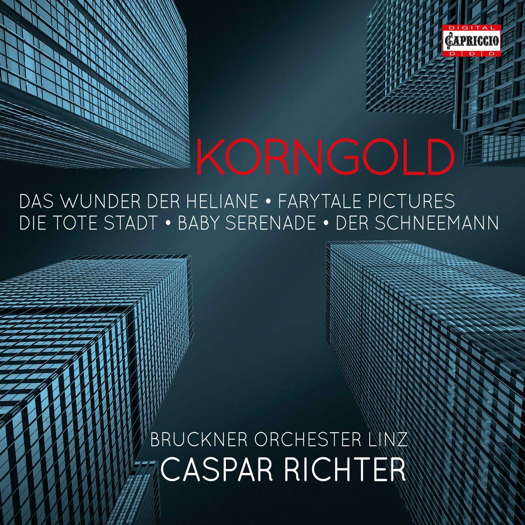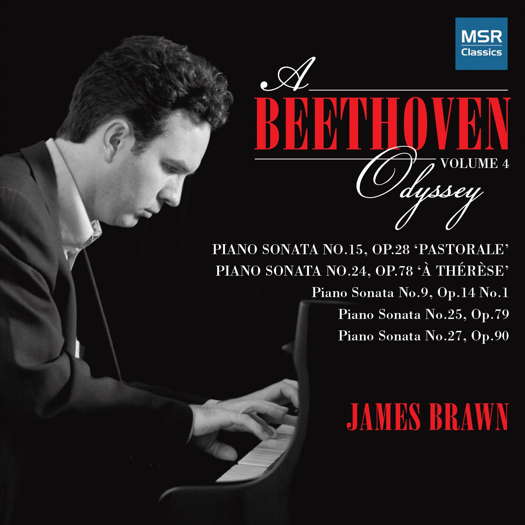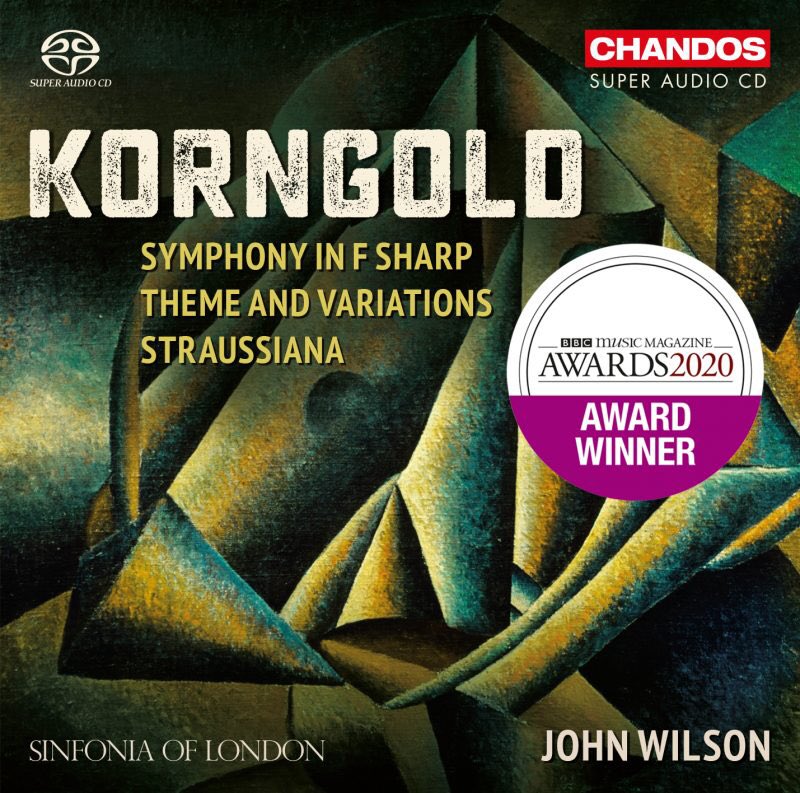- gamelan music
- Northport Records
- Evgenij Onegin
- Sir Arthur Bliss
- Floating Earth
- Murray McLachlan
- Mendelssohn: Hebrides Overture
- Emily Su

A Korngold Renaissance
GIUSEPPE PENNISI reviews a four CD set
of music by the Austrian-born composer
'The wholeness of this anthology is admirable.'
Until a few years ago, opera goers and concert goers, seeing his name in a program, would have said, 'Erich Wolfgang Korngold, who is he?' Instead, fans of old movies would have remembered his name: he was awarded two Oscar prizes for film music and was a finalist for two more. Now we are in a full Korngold Renaissance - even in Italy.
I became quite keen on Korngold (1897-1957) when I saw and listened to his best-known opera Die tote Stadt in Washington in the mid-1970s, in a production by New York City Opera, which had probably staged it for its scabrous and transgressive content. Korngold composed it at the age of twenty-two. (He played and composed from the age of twelve.) It seems that Giacomo Puccini, then sixty-four years old, listened to Korngold in a private performance on the piano. He came out of the Korngold family home, disheartened, thinking that he could never compose music as erotic and sensual as Korngold's for the Turandot finale.
Die tote Stadt arrived in Italy at the 1997 Spoleto Festival and then landed at the La Fenice in Venice and at the Teatro Massimo in Palermo in 2007 and finally at La Scala in Milan last season. A few months ago, Teatro Regio in Turin uncovered Violanta, composed by Korngold at the age of seventeen.
His Concerto for cello and orchestra in C major, Op 37 (of which there are twenty recordings on CD) and his suites for films are performed quite often in concert halls. He composed the Cello Concerto in 1946 for the blockbuster film Deception starring Bette Davis. The rest of his works are little known. However, a production of Die tote Stadt by the Salzburg Festival has toured for about ten years in numerous European opera houses, from Vienna to Barcelona and London: I was lucky enough to catch it in Vienna.
Korngold's concert and operatic music can now be found on various recordings: there two valuable CDs of Die tote Stadt and a recent DVD of Deutsche Oper Berlin's production of Das Wunder der Heliane (where the protagonist, Sara Jakubiak, sings one of the main arias completely naked). All the more in this anthology album of four CDs from Capriccio and on another Capriccio album featuring all his lieder. Korngold has become fashionable, more than sixty years after his death and not only among those who review and listen to movies featuring his music.
'Who was Korngold?' He grew up in Vienna in the years when the capital of the double monarchy (Austria and Hungary) was the intellectual centre of Europe not only for music but also for the figurative arts and the nascent psychiatry. He was at home with music because his father was one of the leading Austrian music critics of the time. He gave concerts at the age of eight, composed operas and ballets at the age of seventen, as well as stage music for performances by Max Reinhardt, one of the greatest stage directors of the time, and one of the founders of the Salzburg Festival. It was so famous that two theatres – Cologne and Stuttgart – competed for the honour of the world premiere of Die tote Stadt in 1920. Finally, both theatres premiered it on the same evening.
As a young man, he lived more in Germany than in Austria. He returned to Vienna when the German Reich felt the unpleasant scent of a likely election victory by the Nazis. He was not involved in politics. After the Anchluss, being Jewish, he fled to the United States where he had golden bridges in Hollywood. He became affluent - indeed rich - with film music and continued to compose concerts and operas: his fifth and final opera, as well as mostly chamber music. His music was moulded upon the contemporary American style of the time.
Known for being a good beef eater and whisky drinker (as well as an inveterate smoker), he had a heart attack in 1945. He recovered and returned to his beloved Vienna in 1947. Allied forces were occupying the city divided into sectors - as well-represented in Carol Reed's film The Third Man. Korngold had enormous difficulties not only to get back in possession of his beloved family home but also to access it. He was celebrated (for his film music), but failed to have his latest opera, Die Kathrin, performed. Disappointed, he returned to Los Angeles. There he composed a symphonic poem, Straussiana, in which he recalled the Vienna of the waltz. Listening nowadays to his music is a joy. This explains the Renaissance.
This introduction to the composer and his music is useful to appreciate fully the four CD album, including an anthology of twenty of his works spanning a forty-five year period. Korngold is known mainly for his Cello Concerto and his late romantic operas such as Violanta, Die tote Stadt and Das Wunder der Heliane. In these three operas, there is a strong influence of Richard Strauss' Salome and Elektra: turgid, lurid and soaked scores on a decadent plot where, such as in Die tote Stadt, an easy-to-hum song is introduced with the obvious intent of charming the audience. One can easily hear it in excerpts from Das Wunder der Heliane.
Listen — Korngold: Introduction (Das Wunder der Heliane)
(CD2 track 2, 0:00-0:42) © 2020 Capriccio Records :
Listen — Korngold: Ich ging zu ihm (Das Wunder der Heliane Act II)
(CD2 track 4, 2:09-3:04) © 2020 Capriccio Records :
There is a quite different Korngold such as in his elegant and festive stage music for Much Ado About Nothing composed at the age of seventeen,
Listen — Korngold: Overture (Much Ado About Nothing)
(CD3 track 1, 0:01-0:56) © 2020 Capriccio Records :
Listen — Korngold: Garden music (Much Ado About Nothing)
(CD3 track 4, 0:59-1:38) © 2020 Capriccio Records :
Listen — Korngold: Maiden in the bridal chamber (Much Ado About Nothing)
(CD3 track 7, 1:20-2:10) © 2020 Capriccio Records :
There is a religious Korngold too, in his Sursum Corda, Op 13, composed in 1920 – almost in parallel with Die tote Stadt, and in his Prayer, Op 32, composed in 1941 during World War II.
Listen — Korngold: Prayer, Op 32
(CD4 track 8, 2:06-3:04) © 2020 Capriccio Records :
There is a melancholy Korngold, such as in his Songs of Farewell, Op 14.
Listen — Korngold: Serene Farewell (Abschiedslieder)
(CD4 track 12, 0:00-0:57) © 2020 Capriccio Records :
This melancholia can also be found in his Straussiana, composed in 1953 with his memories not only of the waltz but of the polka and mazurka too.
Listen — Korngold: Mazurka (Straussiana)
(CD1 track 13, 0:00-0:35) © 2020 Capriccio Records :
Finally, the listener can appreciate the very modern Theme and Variations, also dating from 1953.
Listen — Korngold: Variation VII (Theme and Variations)
(CD3 track 22, 1:45-2:28) © 2020 Capriccio Records :
Thus in this four CD album, we discover a multifaceted composer in tune with his times, both in the Germanic world and in California.
To put the album together has been a daunting job most likely with a view of making a careful selection from a vast and varied production. The CDs do not present previous recordings but they are original renderings, planned to give a good overview of Korngold in his various roles and recorded over a time span of several years. The album includes, of course, the full Cello Concerto, but only excerpts from his main operas - eg only seven minutes - the prelude of Act II - from his best-known opera Die tote Stadt, with a view to making room for other lesser-known but very valuable scores.
Casper Richter and the Bruckner Orchester Linz have taken up the task of selecting and playing the works. Two sopranos - Karen Robertson and Wendy Nielsen, a mezzo - Gigi Mitchell-Velasco and a tenor - Stephen Gould, are the singers in some pieces. The Konzertvereinigung Linzer Theaterchor and the Frauenchor des Mozartchores Linz are the two choruses. Soloists are Zuill Bailey on cello, Tibor Pazmany at the organ and Jochem Hochstenbach on piano. The wholeness of this anthology is admirable. It says a lot about the musical culture in Linz - 200,000 inhabitants - in Oberösterreich.
Copyright © 13 May 2020
Giuseppe Pennisi,
Rome, Italy

CD INFORMATION: KORNGOLD - BRUCKNER ORCHESTER LINZ
FURTHER INFORMATION: CAPRICCIO RECORDS





